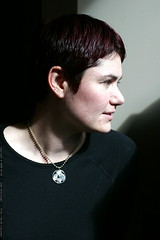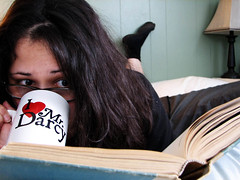When we write, whether on our blogs or in our books, we are looking to connect with an audience. In fiction, generally we do this by working within a genre. On blogs, we do this working within a niche.
But could we do it more granularly? Of course—we could breakdown our target audience by more than just the niche of “reader” or “mystery reader” or “Regency romance lover.” We could look at demographic data—whether we get that from our Facebook page (yep, it’s in there) or Amazon data, we might be able to figure out a description of our readers that’s a lot more specific.

Livia Blackburne talked about profiling readers on her blog, sharing John Locke’s teaching on a profile of his readers. Following his example, Livia wrote out this profile, which is fairly extensive:
My target audience consists of young women, from high school through early 20s. They read to be transported to other worlds, and they actively seek sword and sorcery with female protagonists. They like to read about – for lack of a better term — girls kicking butt. My readers are attracted to strong, larger than life heroines, and they like reading about my main character Kyra because of the cool things she can do. They’d love to be Kyra for a day or two. My readers shy away from situations that are too cut and dry. They’re drawn to moral complexity, hard decisions, and inner conflict. They like a heroine with a dark side (no Pollyanna heroines please), but they still expect good to triumph in the end. My readers want fast-paced action and adventure, with high stakes and lots of plot twists. They don’t want to be bogged down with things like setting details and overly flowery prose.
Livia pulls this knowledge from beta reader feedback and her own knowledge of her story and genre. And then this reader profile can inform not only your current WIP, but future works—and your blog. As Livia explains:
Once you have your psychological profile, you can come up with themes that resonate with your target audience. In my case, it might be girls kicking butt, larger-than-life heroes, and tough moral decisions. And you’d would write a blog post that encapsulated these themes. The idea is that you write blog posts that resonate with your target audience, making them curious to read your book.
As with almost all things, this is easier said than done. Knowing what kind of blog post you’re looking for is definitely a great way to start and can help you generate ideas, but I worry the connection might be a little too abstract (though obviously well-known and well-selling self-publisher John Locke disagrees).
On the other hand, that can be a strength: harping on our books all the time is definitely a negative, while providing the same emotional experience as our books is a great way to set up a promise with our books. Locke calls this a “loyalty transfer.”
What do you think? Would you profile your readers? How would you translate your profile into blog posts?
Starting today, and throughout May, every comment is an entry to win a 15-page critique from me! Winner will be drawn at random from pool of commentators from April 30 to May 31, to be announced on the blog June 1. So come join in the conversation!
Photo (person in profile) by Sean Dreilinger


